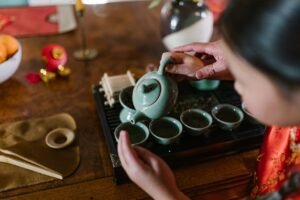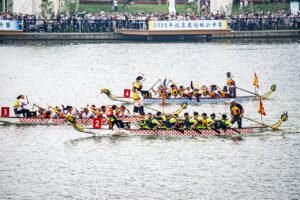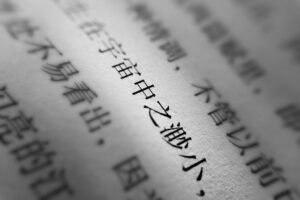China’s rich cultural tapestry is woven with a multitude of festivals that encapsulate its history, traditions, and values. Among these, the Dragon Boat Festival stands out as a vibrant and exciting celebration that showcases the depth of Chinese heritage. Celebrated on the fifth day of the fifth lunar month, this festival, also known as Duānwǔ Jié (端午节, Duānwǔ Jié), is a time of exhilarating boat races, delectable traditional foods, and ancient customs that date back over two millennia.
Table of Contents
ToggleOrigins and Historical Significance
The Dragon Boat Festival has its roots deeply embedded in Chinese history and legend. The most popular story behind the festival centers around the life and death of the esteemed Chinese poet and statesman Qū Yuán (屈原, Qū Yuán), who lived during the Warring States period (战国时期, Zhànguó Shíqī) (475-221 BCE). Qū Yuán was a loyal minister of the Chǔ (楚, Chǔ) state and a vocal advocate for political reform. His honest counsel and integrity, however, made him many enemies in the royal court, leading to his eventual exile.
In exile, Qū Yuán continued to write poetry, expressing his profound love for his country and his despair over its declining state. His most famous works, including “Lí Sāo” (离骚, Lí Sāo), reflect his patriotic spirit and his personal sorrow. When the state of Chǔ fell to the Qín Dynasty (秦朝, Qín Cháo), Qū Yuán, in utter grief and despair, drowned himself in the Mìluó River (汨罗江, Mìluó Jiāng) on the fifth day of the fifth lunar month. According to legend, the local people raced out in their boats to save him or retrieve his body, beating drums and splashing the water with their paddles to scare away fish and evil spirits. This tradition evolved into the present-day dragon boat races.
Dragon Boat Races
One of the most exhilarating aspects of the Duānwǔ Jié is the lóngzhōu jìngsài (龙舟竞赛, lóngzhōu jìngsài) or dragon boat races. These races are a spectacle of speed, strength, and coordination, held in various rivers, lakes, and coastal areas across China and other parts of the world with significant Chinese communities. The boats, often measuring up to 30 meters in length, are ornately decorated with the heads and tails of dragons, symbolizing power, courage, and majesty.
The races involve teams of paddlers, usually ranging from 20 to 80 people, who row in unison to the rhythmic beating of a gǔ (鼓, gǔ). The drummer, sitting at the front of the boat, plays a crucial role in maintaining the paddlers’ coordination and morale. The sight of these long, colorful boats gliding through the water to the beat of the drums is both thrilling and mesmerizing. Winning these races is not only a matter of skill and teamwork but also brings honor and prestige to the victors.
Traditional Foods: Zòngzi
No Dragon Boat Festival is complete without zòngzi (粽子, zòngzi), a traditional Chinese food made of glutinous rice stuffed with various fillings and wrapped in zhúyè (竹叶, zhúyè) or bamboo leaves. The fillings can range from sweet options like hóngdòu shā (红豆沙, hóngdòu shā) and zǎo (枣, zǎo) to savory ones like salted duck egg (咸鸭蛋, xián yādàn), pork (猪肉, zhūròu), and mushrooms (香菇, xiānggū). The wrapping process is an art in itself, requiring skill to ensure that the rice cooks evenly and the filling remains intact.
Zòngzi has a direct connection to the legend of Qū Yuán. It is said that after Qū Yuán’s death, the local people threw packets of rice into the river to prevent the fish from eating his body. Over time, these packets evolved into the zòngzi we know today. Eating zòngzi during the festival is a way to honor Qū Yuán’s memory and enjoy a delicious, culturally significant treat.
Customs and Practices
Beyond lóngzhōu jìngsài and food, the Duānwǔ Jié is rich with other customs and practices aimed at warding off evil spirits and disease. People hang chángpú (菖蒲, chángpú) and àicǎo (艾草, àicǎo) leaves on their doors, wear xiāngbāo (香包, xiāngbāo) or sachets filled with aromatic herbs, and drink xiónghuángjiǔ (雄黄酒, xiónghuángjiǔ), believed to have protective qualities. These practices reflect the ancient Chinese emphasis on health and well-being, particularly important during the summer months when diseases were more prevalent.
Modern Celebrations
Today, the Dragon Boat Festival is a public holiday in China and is celebrated with much enthusiasm and community spirit. Schools and workplaces often organize cultural activities and educational events to teach younger generations about the festival’s history and significance. In addition, many cities host dragon boat races that attract both local participants and international teams, fostering a spirit of unity and cultural exchange.
Conclusion
The Dragon Boat Festival, with its dynamic blend of history, culture, and communal joy, offers a unique window into the Chinese way of life. Whether you’re watching a thrilling lóngzhōu jìngsài, savoring a bite of zòngzi, or partaking in traditional customs, Duānwǔ Jié is a reminder of the enduring legacy of Qū Yuán and the rich cultural heritage of China. By embracing and learning about this festival, one gains a deeper appreciation of the values and traditions that have shaped Chinese society for centuries.
Dragon Boat Festival – Vocabulary
- 中国文化, Zhōngguó wénhuà, Chinese culture
- 端午节, Duānwǔ Jié, Dragon Boat Festival
- 庆祝, qìngzhù, Celebrated
- 赛龙舟, sài lóngzhōu, Boat races
- 传统食品, chuántǒng shípǐn, Traditional foods
- 风俗, fēngsú, Customs
- 历史和传说, lìshǐ hé chuánshuō, History and legend
- 屈原, Qū Yuán, Qu Yuan
- 战国时期, Zhànguó Shíqī, Warring States Period
- 汨罗江, Mìluó Jiāng, Miluo River
- 龙舟竞赛, lóngzhōu jìngsài, Dragon boat races
- 鼓, gǔ, Drum
- 粽子, zòngzi, Zongzi
- 红豆沙, hóngdòu shā, Red bean paste
- 枣, zǎo, Dates
- 咸鸭蛋, xián yādàn, Salted duck egg
- 猪肉, zhūròu, Pork
- 香菇, xiānggū, Mushrooms
- 竹叶, zhúyè, Bamboo leaves
- 菖蒲, chángpú, Calamus
- 艾草, àicǎo, Mugwort
- 香包, xiāngbāo, Sachet
- 雄黄酒, xiónghuángjiǔ, Realgar wine







